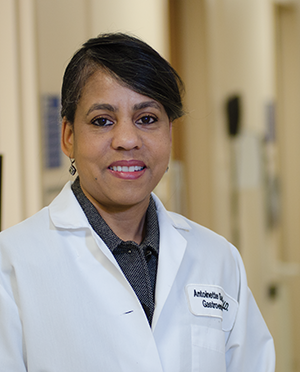The term clinical nutritionist brings to mind someone expert in the impact of food on health and wellness; the clinical equivalent of a lifestyle guru, best suited to advising patients about what diets might help them achieve specific health-related goals. Although well-adult care is crucial, especially as our nation faces an alarming obesity epidemic, it’s not what inspired Antoinette Saddler to pursue the field, and the image bears little resemblance to her day-to-day duties.

“My patients who need nutrition support often present with severe — sometimes life-threatening — malnutrition,” says Saddler, who earned her M.D. at Case Western Reserve University School of Medicine and completed a fellowship in nutrition support at Memorial Sloan Kettering Cancer Center in New York City in the early ’90s. “Our first step is to determine if there is any way to feed the patient normally. When that isn’t possible, we have to think about artificial means of restoring their nutritional status.” Such measures include tube feeding and intravenous feeding, explains Saddler, on either a short-term or chronic basis.
Saddler, assistant professor of medicine at GW’s School of Medicine and Health Sciences (SMHS), is a certified gastroenterologist who specializes in clinical nutrition. This means that beyond treating common gastrointestinal problems such as ulcers and acid reflux, she deals with severe digestive disorders such as gastroparesis, which typically requires a combination of dietary intervention and medications.
Saddler, who joined the SMHS faculty in 2006, says that she wasn’t always interested in medicine, but suspects that her childhood exposure to the field — her father was a physician, her mother was a nurse, and her younger sister was born with a number of genetic anomalies that left her mentally disabled — may have influenced her career path. “I had a lot of exposure to illness among my parents’ patients and in my own family, which helps me relate very strongly to my patients and what they’re experiencing,” Saddler says.
She values the multidisciplinary approach inherent to the field of nutrition support. “Unlike a lot of other areas of medicine, nutrition involves medical professionals from a variety of fields. Physicians are a part of that picture, but so are registered dietitians, nurses, and pharmacists. The contributions of each profession are equally important in nutrition, and mastering the art of collaboration is what results in optimal patient care,” she says.
“The contributions of each profession are equally important in nutrition, and mastering the art of collaboration is what results in optimal patient care.” —Antoinette Saddler, M.D.
“Dr. Saddler is an outstanding patient advocate who is committed to exceptional care,” says Marie Borum, M.D., Ed.D, professor of medicine at SMHS and director of the Division of Gastroenterology at the GW Medical Faculty Associates, adding that as one of the few clinical nutritionists in the D.C. area, Saddler fills an essential role in promoting optimal health for her patients.
The cultural importance of eating makes already complex nutrition interventions all the more difficult. “I think a lot about the cultural and personal importance of being able to sit down and share a meal,” Saddler says. “Many of my patients can’t do that.” When the underlying conditions causing malnutrition are incurable, the question of whether it is appropriate to intervene with nutrition support arises. “I do my best to leave my personal biases out of the equation,” says Saddler. “I try to provide the patients and their families with as much information as I can about the implications of each choice, and then allow their personal wishes, faith, and philosophy to lead them to the proper decision for them.”



